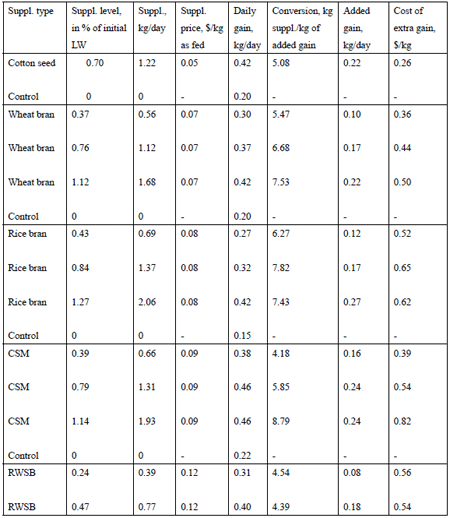Use of agricultural by-products for cattle feed in South America-Case Argentina
Description
The northeastern area of Argentina has a humid subtropical climate with severe conditions of -7○C in winter and over 40○C in summer, where beef cattle production is one of the major industries. However, due to the low quality of rangeland, which is the main feed resource, there are many problems, especially in winter: high mortality, longer time to mature, low quality of meat, low breeding rate, etc. To solve these problems, use of locally available agriculture by-products for feed for beef cattle was studied in collaboration with INTA Colonia Benitez. From our three years’ joint study and a previous INTA study, the results can be summarized as follows as a preliminary recommendation.
- Cotton seed: Economical feeding amount is up to 1 kg/head/day, which will result 200–400 g of daily gain. The cost for 1 kg of body weight gain is US$0.26~0.33. Cottonseed should not be used at more than 1 kg/animal in the finishing phase, since it may cause consumer acceptability problems with the beef.
- Wheat bran: Wheat bran is usually sold in pellet form. 100 g of daily gain is expected when given at 0.4% of body weight. The cost for 1 kg of body weight gain is US$0.36. Make sure to have enough feeder space to avoid overeating by dominant animals due to high palatability, which results in different body weight gains.
- Rice bran: Economical feeding amount is 0.4% of body weight. The cost for 1 kg of body weight gain is US$0.52. Rice bran is also available in the Region (Corrientes, Formosa). Rice bran is usually more expensive than wheat bran. It gives the same type of biological response but is more expensive. Rice bran is palatable but because it is a fine powder, it may cause refusals at high supplementation levels (at more than 1% of body weight). The choice will be dictated by price. Sometimes there is over-supply and can be a good option.
- Cotton seed meal: 0.4% of body weight of cottonseed meal can be fed as a protein supplement. The cost for 1 kg of body weight gain is US$0.39. Cottonseed meal should not be used at more than 0.8% of body weight because of very inefficient use of the supplement.
- Whole raw soybeans: When fed at 0.5% of body weight, the cost for 1 kg of body weight gain is US$0.54. This cost may decrease by up to 50% if soybeans unsuitable for the oil industry are used. It should not be used at more than 0.5% of body weight. Higher levels will cause a substitution effect with lower feed efficiency and lower pasture intake. Whole soybeans are now available at several locations in Chaco.
If the previous feeding method for beef cattle without supplemental feed is used, many problems, such as high mortality in winter, low meat quality and slow breeding were observed. However, these problems were greatly improved by feeding locally available and economical agriculture by-products.
Figure, table
-
Summary of performance of growing heifers during the first winter after calving (data includes three trials carried by EEA-Colonia Benitez before the joint project).
- Affiliation
-
Japan International Research Center for Agricultural Sciences Animal Production and Grassland Division
- Term of research
-
FY2002~2007
- Responsible researcher
-
KUDO Hiroshi ( Animal Production and Grassland Division )
BALBUENA Osvaldo ( National Institute of Agricultural Technology )
GAGIOTTI Monica ( National Institute of Agricultural Technology )
ARAKAKI Cristina ( National Institute of Agricultural Technology )
- ほか
- Publication, etc.
-
Kucseva, C. D. y Balbuena, O. (1998): Consumo voluntario de semilla de algodon y pellet integral de algodon fortificado en condiciones de pastoreo. Presentado en XIX Sesion de Comunicaciones Cientificas, Facultad de Ciencias Veterinarias, UNNE, Corrientes, Brasil
Balbuena, O, Kucseva, C.D., Rochinotti, D., Slanac, A.L., Somma de Fere, G.R., Schriner, J.J., Navamuel, J.M. y Koza, G.A. (2002): Niveles de suplementacion proteica invernal para recria de bovinos para carne en pasturas tropicales. Rev. Arg. Prod. Animal, 22(Supl. 1):16-17.
Balbuena, O; Rochinotti, D.; Flores, J.; Somma de Feré, G.; Kucseva, C.D.; Slanac, A.L.; Stharinnger, C.; Kudo., H; Arakaki, C.L (2004): Suplementacion con soja en recria de bovinos para carne en pasturas tropicales. Rev. Arg. Prod. Animal, 24(Supl. 1): 4-5.
- Japanese PDF
-
2005_seikajouhou_A4_ja_Part11.pdf564.83 KB

